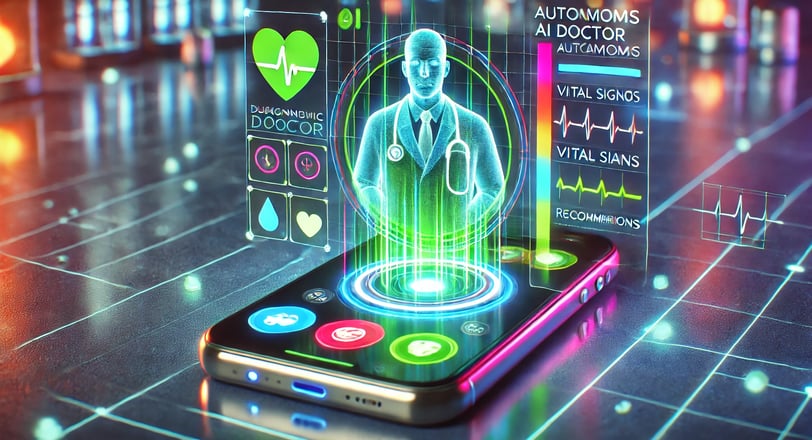Autonomous AI Doctors in Your Pocket: The Future of Healthcare
Discover how Autonomous AI Doctors are transforming healthcare! Explore cutting-edge devices like BioButton and Babylon Health, learn about real-world applications, and see how companies like Google and Apple are driving this revolution. AI healthcare is here—are you ready?


Introduction
Imagine a world where a pocket-sized device acts as your personal doctor, offering real-time diagnoses, monitoring your health, and providing actionable advice 24/7. With advancements in artificial intelligence, Autonomous AI Doctors are now making this vision a reality. Combining wearable technology, sophisticated sensors, and AI-driven analytics, these devices are transforming the way we approach healthcare.
In this blog, we’ll explore:
How autonomous AI doctors work.
Real-world applications and benefits.
Leading devices and companies in this space.
Ethical considerations and future potential.
1. How Do Autonomous AI Doctors Work?
Autonomous AI doctors function through a blend of cutting-edge technologies:
1.1. Data Collection via Sensors
Devices like smartwatches or dedicated health monitors collect physiological data in real-time.
Metrics include:
Heart rate, oxygen levels, blood pressure, glucose levels, and more.
Example:
A diabetic user wears a continuous glucose monitor (CGM) that provides alerts when blood sugar levels fluctuate dangerously.
1.2. AI-Powered Diagnostics
AI algorithms analyze data collected by sensors and compare it to large medical databases.
These algorithms use:
Machine Learning to recognize patterns and diagnose conditions.
Natural Language Processing (NLP) to interact conversationally with users.
1.3. Connectivity and Cloud Integration
Devices sync with cloud-based platforms, accessing the latest medical research and drug information.
Example:
A wearable detects abnormal heart rhythms and suggests further tests by consulting a cloud database of similar cases.
1.4. Decision Support
Provides actionable advice, such as:
Adjusting diet for better glucose control.
Recommending medical attention for concerning symptoms.
2. Real-World Applications
Autonomous AI doctors are making a significant impact across various healthcare domains:
2.1. Chronic Disease Management
Role: AI doctors monitor chronic conditions like diabetes, hypertension, and cardiovascular diseases.
Example:
A user with hypertension receives real-time blood pressure monitoring and tips for reducing stress, all via their AI device.
2.2. Preventive Healthcare
Role: Predicts potential health risks before symptoms appear.
Example:
An AI device detects irregularities in sleep patterns and warns about potential heart health risks.
2.3. Emergency Response
Role: Recognizes emergencies and provides immediate guidance.
Example:
A fall detection system in an AI doctor alerts emergency services and provides CPR instructions if needed.
2.4. Personalized Health Advice
Role: Offers lifestyle recommendations based on individual health data.
Example:
Suggests specific workout routines or dietary changes based on calorie burn and nutritional intake.
2.5. Bridging the Healthcare Gap
Role: Provides medical advice in remote or underserved regions.
Example:
Diagnoses common illnesses like fevers and infections in areas with limited access to doctors.
3. Devices and Companies Leading the Way
3.1. Top Devices
1. BioButton (BioIntelliSense)
Features: Tracks over 20 physiological metrics like temperature, heart rate, and respiration.
Use Case: Ideal for remote patient monitoring post-surgery.
Unique Selling Point: Compact and highly accurate.
2. KardiaMobile (AliveCor)
Features: Portable ECG monitor that detects atrial fibrillation and other cardiac issues.
Use Case: For users with cardiovascular risks.
Unique Selling Point: FDA-approved and trusted by cardiologists.
3. Babylon Health App
Features: AI-driven symptom checker with telemedicine integration.
Use Case: Accessible healthcare through smartphones.
Unique Selling Point: Combines AI with human expertise.
4. Health Mate (Withings)
Features: Smartwatch with blood oxygen monitoring, ECG, and sleep tracking.
Use Case: For fitness enthusiasts and those tracking chronic conditions.
Unique Selling Point: Sleek design with medical-grade accuracy.
3.2. Leading Companies
1. Google Health
Contribution: Developing AI models for detecting conditions like cancer and diabetic retinopathy.
Notable Project: Google’s DeepMind AI outperformed radiologists in breast cancer detection.
2. Apple
Contribution: Apple Watch’s advanced health features include ECG monitoring and irregular rhythm notifications.
Notable Impact: Empowering users to track their health with ease.
3. Babylon Health
Contribution: Pioneer in AI-powered symptom checkers and global telemedicine.
Notable Feature: Personalized health advice via mobile apps.
4. AliveCor
Contribution: Revolutionizing cardiac care with portable, AI-enabled ECG devices.
Notable Feature: High accuracy in detecting atrial fibrillation.
4. Benefits and Challenges
4.1. Benefits
Accessibility:
Brings quality healthcare to remote and underserved areas.
Example: Farmers in rural areas using AI for primary diagnoses.
Cost Efficiency:
Reduces the need for frequent doctor visits, saving time and money.
Proactive Healthcare:
Early detection of conditions prevents severe health crises.
Convenience:
Round-the-clock availability eliminates the need to wait for appointments.
4.2. Challenges
Accuracy and Limitations:
While effective for common conditions, rare diseases might require human intervention.
Data Privacy:
Health data security must be ensured to prevent misuse.
Adoption Barriers:
High costs and technical literacy requirements can limit usage.
5. Ethical and Future Considerations
Ethical Concerns:
AI devices must prioritize user consent and transparency in diagnoses.
Future Potential:
Advanced Diagnostics: Integrating genomic data for hyper-personalized care.
Global Health Equity: Affordable AI devices for widespread use.
Conclusion
Autonomous AI doctors are revolutionizing healthcare by offering personalized, accessible, and efficient solutions. With companies like Google Health, Apple, and Babylon Health leading the charge, the future of healthcare is not only high-tech but also increasingly patient-focused. As technology continues to advance, AI doctors could become indispensable tools in our everyday lives.
🌟 Would you trust an AI doctor? Share your thoughts in the comments! 🌟
